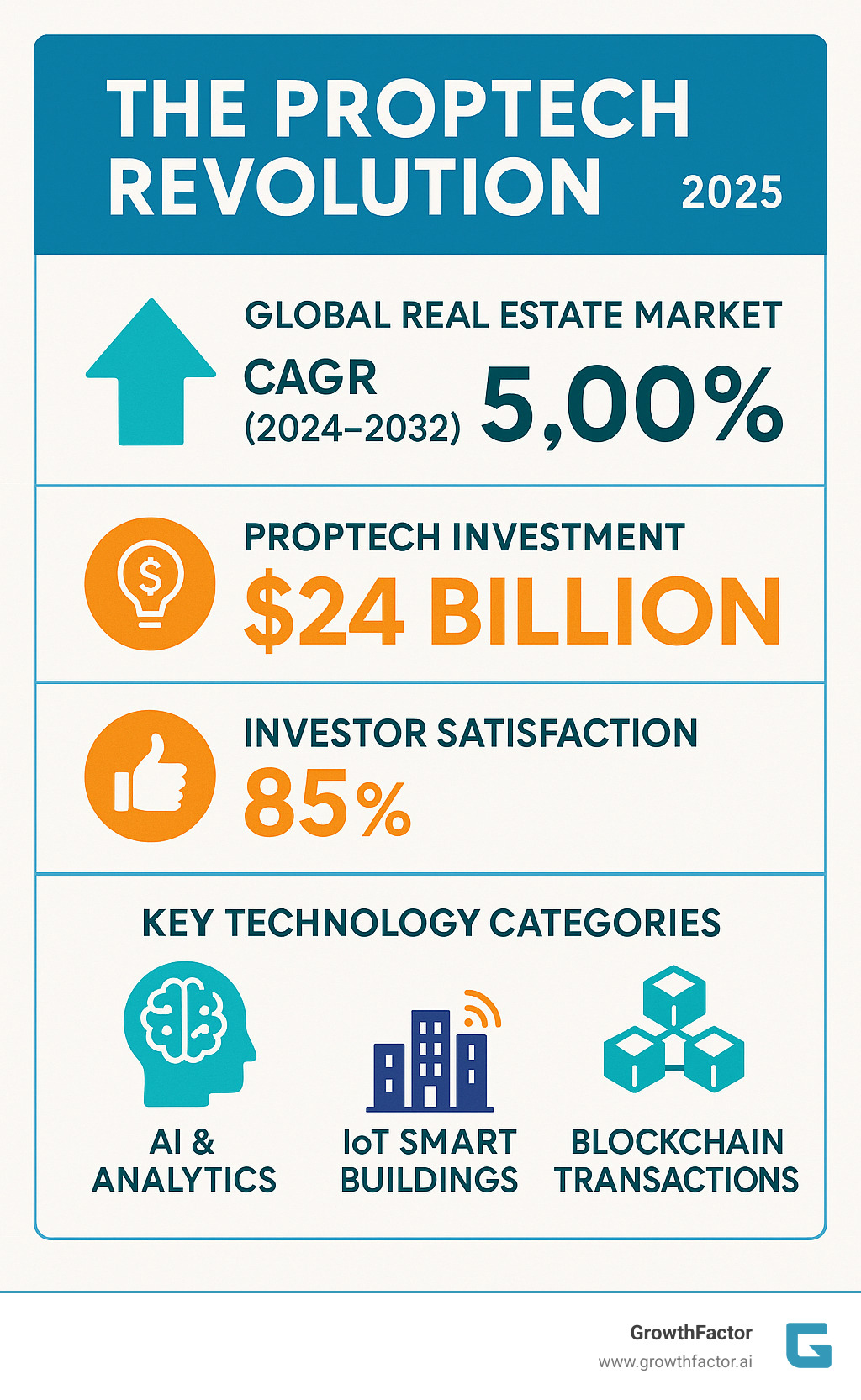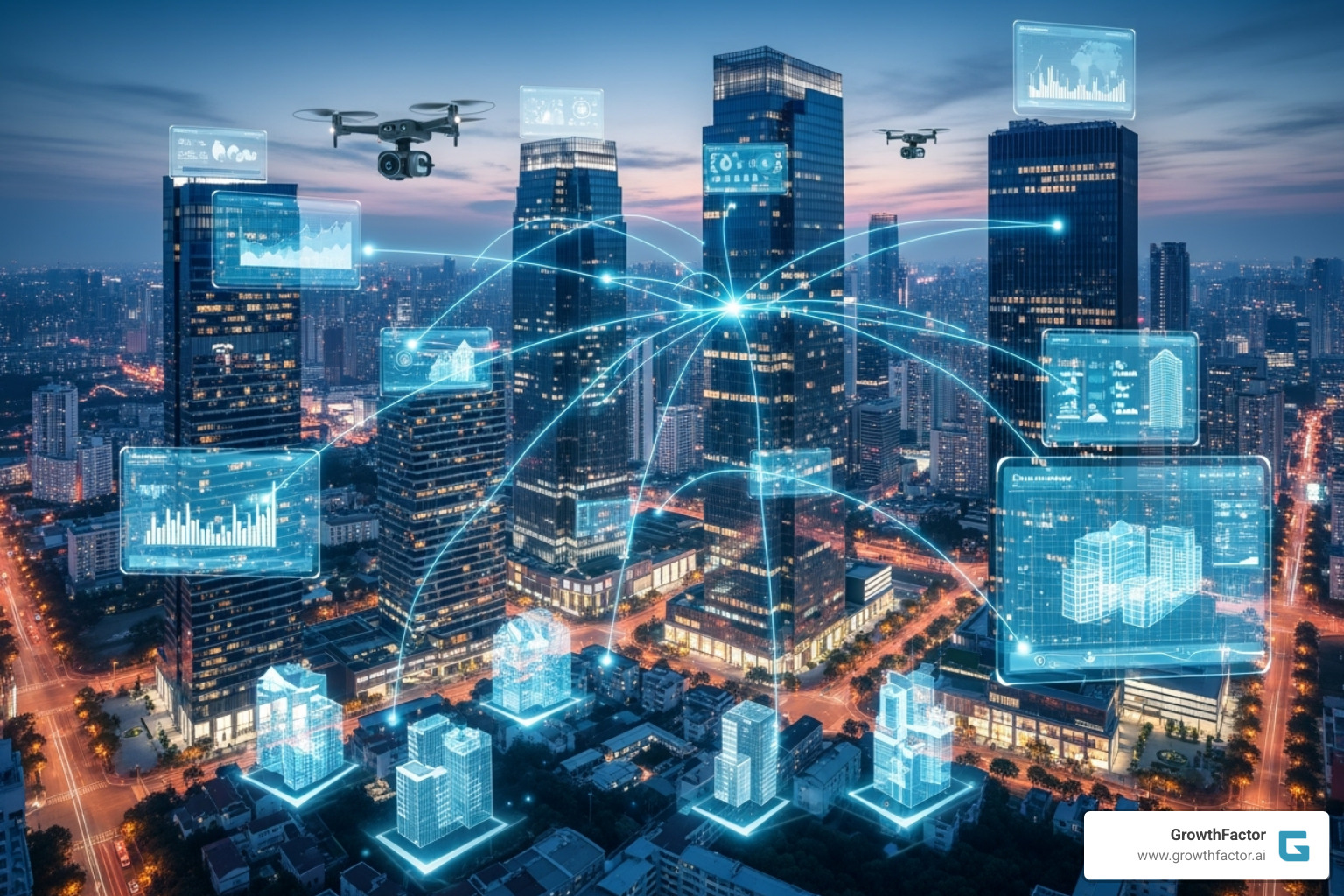Innovating CRE: A Guide to Modern Real Estate Technology
Written by: Clyde Christian Anderson
The PropTech Revolution: An Introduction

Commercial real estate tech is changing how properties are bought, sold, managed, and experienced through digital tools, artificial intelligence, and smart building systems. This technology revolution—known as PropTech—encompasses everything from AI-powered site selection platforms to IoT-enabled smart buildings that optimize energy use and tenant experiences.
Key commercial real estate technologies include:
- AI and Big Data Analytics for predictive modeling and automated valuations
- Smart Buildings and IoT for energy management and predictive maintenance
- Virtual and Augmented Reality for 3D property tours and remote viewing
- Blockchain and Digital Platforms for smart contracts and secure closings
- Property Management Software for lease and deal management automation
Historically slow to adopt new technology, the commercial real estate industry was forced into rapid digital change by the COVID-19 pandemic, which exposed major gaps in traditional processes.
"While most executives are optimistic about their company's performance, they're also concerned about economic uncertainty, tariffs and rising costs. One potential solution for commercial real estate: property technology (or proptech)," according to J.P. Morgan's 2025 Business Leaders Outlook.
The numbers tell the story: The global real estate market is projected to grow at a 5.00% compound annual growth rate (2024–2032), while PropTech investment has reached $24 billion globally. Crucially, 85% of investors report their PropTech portfolio companies are meeting or exceeding growth expectations.
This shift is about survival and competitive advantage. Companies embracing technology can evaluate five times more sites efficiently, reduce costs, and make faster, data-driven decisions that boost their bottom line.
I'm Clyde Christian Anderson, Founder and CEO of GrowthFactor.ai, where we've helped retail clients open up $1.6 M in cash flow through AI-powered site selection technology. Having worked in retail real estate since age 15 and later in investment banking, I've seen how commercial real estate tech can transform manual, time-consuming processes into streamlined, profitable operations.

Key Pillars of Commercial real estate tech
The change of commercial real estate is built on four foundational technologies that are changing how we work, think, and succeed in this industry. These are practical tools that solve real problems and create genuine competitive advantages.
How AI and Big Data Analytics Drive Decision-Making
McKinsey's research confirms that AI can predict rent rate changes with up to 90% accuracy and other property metrics with 60% accuracy. We've moved from educated guesses to data-driven decisions with unprecedented precision.

Automated valuation models (AVMs) have revolutionized property assessment. Instead of waiting weeks for appraisals, AI systems analyze massive datasets to generate accurate property estimates in minutes. A well-known example is Zillow's free Zestimate tool, which even uses computer vision to analyze property photos.
Sophisticated market trend forecasting uses predictive analytics to anticipate market shifts, helping investors spot opportunities and set optimal prices. Big data analysis also provides deep insights into tenant behavior, allowing for personalized experiences that improve retention and profitability.
At GrowthFactor, we've seen how streamlined site selection transforms businesses. Our AI Agent Waldo automates qualification and evaluation processes, allowing teams to evaluate five times more sites efficiently. We can size up a site in minutes, identify potential clients by analyzing ownership and sales history, and even generate optimized property descriptions automatically. For more insights on this approach, check out our guide on Site Selection in Real Estate: A Data-Driven Approach.
AI-powered document processing eliminates tedious work like lease abstraction and contract review, freeing up professionals to focus on high-value tasks. The due diligence process is also transformed by platforms offering deep visibility into foot traffic, migration patterns, and market data. This location intelligence enables faster, more confident acquisition decisions. The result is that decision-making has evolved from guesswork to data-driven science. For a deeper understanding, explore our article on Real Estate Market Analysis with AI.
The Rise of Smart Buildings and the Internet of Things (IoT)
Smart building technology, powered by the Internet of Things (IoT), transforms properties into intelligent environments. By embedding sensors and connectivity into systems like HVAC and lighting, these buildings collect real-time data to think, adapt, and self-optimize.
Key benefits include:
- Energy Efficiency: IoT sensors adjust climate and lighting based on occupancy and weather, potentially cutting energy use by up to 30%. This reduces costs and supports sustainability goals.
- Predictive Maintenance: Sensors monitor equipment health to anticipate failures in systems like HVAC or elevators, preventing costly emergency repairs and minimizing tenant disruption.
- Improved Tenant Experience: Smart building apps allow occupants to control their environment, book amenities, and request maintenance directly from their smartphones.
- Improved Security: IoT-powered security offers AI-enabled video surveillance, cloud-based access control, and real-time monitoring for a safer, more seamless environment.
- Centralized Operations: Integrated dashboards give property managers a complete view of building performance, enabling proactive management.
These technologies transform buildings from static structures into responsive environments that improve both tenant satisfaction and operational efficiency. Learn more about how these innovations impact day-to-day operations in our guide to AI in Property Management.
Immersive Experiences: How VR and AR are Changing Property Tours
Gone are the days of fuzzy property photos. Immersive technologies like virtual and augmented reality are changing how we experience spaces. Goldman Sachs predicts the virtual reality market will approach nearly $80 billion by 2025, with real estate as a key driver.

Virtual property tours allow prospective tenants and investors to take immersive 360-degree tours from anywhere. This is ideal for properties under construction or for remote clients, who can explore layouts and visualize renovations without traveling.
Augmented reality (AR) overlays bring digital information into the real world. Using a tablet in an empty space, a user can see virtual furniture arrangements or utility locations, turning a simple walkthrough into an interactive experience.
VR and AR space planning tools enable collaborative design, allowing architects, designers, and tenants to optimize layouts in a virtual environment. This prevents costly mistakes and ensures the final space meets all requirements. Remote property viewing via VR also saves significant travel time and expense, accelerating decision-making.
The interactive nature of VR/AR tours creates memorable experiences. Industry reports show 74% of agents using these platforms win more listings, demonstrating a clear competitive advantage. These are practical tools that streamline leasing and sales while creating more informed, confident decision-making.
Streamlining Transactions with Advanced Commercial Real Estate Tech
Advanced commercial real estate tech is streamlining the traditionally complex transaction process, making it faster, more secure, and more straightforward.
Blockchain technology provides an immutable, transparent record of property data, reducing fraud. Smart contracts automate execution, such as releasing funds when conditions are met, eliminating intermediary delays. Tokenization enables fractional ownership, allowing investors to trade digital shares of properties, which increases accessibility and liquidity.
Digital closing platforms use e-signatures and secure document sharing to accelerate closings. Companies like Endpoint digitize the entire process, using advanced security to combat wire fraud. AI-powered lease abstraction tools automatically extract key data from complex legal documents, reducing errors and freeing up professionals for high-value work. Learn more in our AI-Powered Lease Abstraction guide.
Comprehensive deal tracking software manages the entire pipeline with features like automated qualification and deal analysis. This streamlines communication and ensures no leads are lost. Explore solutions in our Real Estate Deal Tracking Software resource. This evolution leads to faster, more secure, and transparent transactions, reducing administrative burdens and turning weeks of work into days.
Embracing the Future: Challenges, Opportunities, and Your Competitive Edge
Adopting commercial real estate tech presents real challenges, but the rewards are significant. The journey requires navigating problems that many in our industry face daily.
Overcoming Adoption Problems and Seizing Opportunities
Change is hard, especially in a relationship-driven industry. Key adoption challenges include:
- Resistance to Change: Seasoned professionals may worry about steep learning curves or that technology will replace the human element of the business.
- Integration Issues: Disparate PropTech solutions often don't communicate with each other, leading to complexity and added expense.
- Data Privacy and Security: These are paramount concerns, given the rise of cyber threats and the sensitive nature of property and tenant information.
- Implementation Costs: The initial investment in software and training requires careful budgeting, though the long-term ROI is strong.
- The Talent Gap: It can be difficult to find professionals skilled in both real estate and emerging technology.

Despite these problems, the opportunities are too great to ignore. The pandemic proved that adaptability is essential for survival, and companies that accepted technology thrived. PropTech delivers remarkable efficiency gains, leading to significant cost savings. The ROI improvements are clear, with data-driven insights leading to measurable increases in Net Operating Income (NOI) and property valuations.
Tenant satisfaction becomes a key differentiator. Properties offering seamless digital experiences and proactive service command higher rents and retain more tenants. Data-driven insights replace guesswork with strategy, enabling informed decisions based on real-time data and predictive analytics.
The Future Outlook for PropTech and How to Stay Ahead
The future of commercial real estate tech is about reimagining how we work. Today's emerging trends will reshape the industry.
AI analytics are evolving from predictive to prescriptive, recommending specific actions and enabling hyper-personalization that anticipates tenant needs. VR and AR will become commonplace for virtual development simulations and AR-improved facility management. The integration of smart technologies will create truly autonomous buildings that learn and adapt, while sustainability tech is becoming essential due to investor ESG demands.
Trends like iBuying, as noted by the New York Times, point to more algorithm-driven transactions, while blockchain will further enable fractional ownership and create more liquid real estate investments.
How do you stay ahead in this rapidly evolving landscape?
- Accept Continuous Learning: Professionals must adopt new platforms and develop data literacy to thrive.
- Focus on the User Experience: Technology that improves interactions for tenants, investors, and your team will be a key differentiator.
- Leverage AI for a Competitive Edge: Our AI Agent Waldo enables teams to evaluate five times more sites by automating qualification processes. This amplifies human expertise, freeing professionals to focus on high-value strategic work while technology handles the heavy lifting.
The future belongs to firms that combine technology with deep industry expertise. By embracing innovation and focusing on client value, you can steer the challenges ahead and turn them into opportunities for growth.
Ready to see how AI can transform your site selection process? Find out how to empower your site selection teams with the technology that's already helping industry leaders stay ahead of the curve.
Citations
The human algorithm
Request Your demo
Schedule meeting
Or submit your information below and we'll be in touch to schedule.


